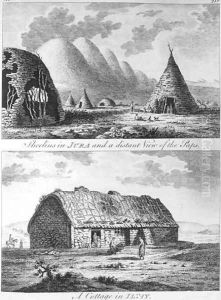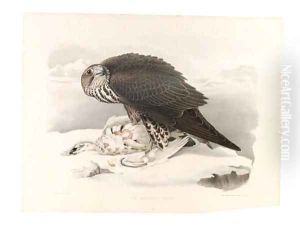Thomas Pennant Paintings
Thomas Pennant was a Welsh naturalist, traveler, and writer, born on June 14, 1726, in Downing, Flintshire, Wales. Despite his significant contributions to natural history and antiquities, particularly in the context of Great Britain and parts of Scandinavia, Pennant is not primarily known as an artist in the traditional sense. His work, however, includes detailed illustrations accompanying his observations on natural history, which have been valuable for both scientific and historical research.
Pennant was educated at Wrexham Grammar School and later at Queen's College, Oxford, but left without taking a degree. He was deeply interested in the natural world from a young age, an interest that shaped his future endeavors. Pennant embarked on several tours throughout Britain, documenting flora, fauna, and geological features. His observations were meticulously recorded in a series of publications that gained him recognition among contemporaries and later scholars. Notably, his 'Tours in Scotland' and subsequent volumes provided a comprehensive account of Scottish natural history and cultural heritage at the time.
In addition to his travels in Britain, Pennant communicated with naturalists across Europe and contributed to the broader scientific community through his writings and correspondence. His major works include 'British Zoology,' 'A Tour in Scotland,' 'A Tour in Wales,' and 'The History of Quadrupeds.' These publications were among the first to combine scientific rigor with accessible language, making them valuable resources for both scholars and the general public.
Pennant's legacy extends beyond his contributions to natural history and includes his efforts in antiquarian studies. He was a member of the Royal Society and corresponded with many of the leading intellectuals of his time. Despite the fact that his primary contributions were not in the realm of fine arts, the illustrations found in his works are an important part of his legacy, providing insights into the historical representation of British wildlife and landscapes.
Thomas Pennant passed away on December 16, 1798, at his home in Downing. His body of work remains a significant source for researchers interested in the natural history and antiquities of the 18th century. Through his detailed observations and writings, Pennant has been regarded as a pioneering figure in the field of zoology and one of the most influential naturalists of his era.

